First Bass Men
The Four-String Mutual Admiration Society proudly presents: Rush's GEDDY LEE and Primus' LES CLAYPOOL. The Blows are low, but never off-bass
By Alan diPerna, Guitar World, June 1992, transcribed by Dave Ward
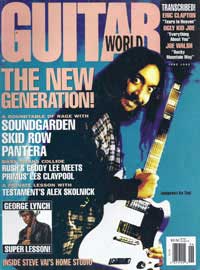
A couple of songs into Primus' opening set for Rush, bassist Les Claypool steps up to the mic. "Hey, I've just had the biggest thrill of my career," he yells triumphantly, gesturing like a Roman orator. "I just had a photo session with Geddy Lee!" The response by those crowding Houston's Summit Arena is instantaneous: a thousand limbs jerk ceilingward in a raised-fist salute, to the tune of a huge roar. For one moment, the ordinarily deep divide between audience and warm-up band is erased. The guys in Primus become just three more screaming Rush fans, eagerly anticipating the band's two-hour spectacle of a set.
Claypool was a ten-year-old boy when Rush's first album came out in 1974. Eighteen years later, Rush are on their 18th album, Roll The Bones, while Primus have just released their third, Sailing The Seas Of Cheese. His resume may not be as long, but Les Claypool is well on his way to becoming Geddy Lee's peer, as well as his fan.
Their names regularly appear side-by-side in "Best Bassist" polls. Both have dramatically expanded the bassist's role in a rock-trio context. Claypool uses the six-string bass and right-hand tapping to add skewed melodies to his wicked funk syncopations. And Lee has taken the concept of bassist-as-orchestra to its ultimate limits, augmenting his clear, fluid lines with bass pedals and synths.
It's hard to imagine two more different people. Claypool's stompin,' hollerin,' redneck persona is greatly at odds with the polite, thoughtful guy Les is offstage. Geddy Lee, on the other hand, is a full-time member of the Noel Redding School of laid-back, emaciated, bespectacled bassists. Different as Geddy and Les are, though, they happen to be the best of friends - fishing buddies, yet. So, good cheer filled the air as the two recently settled down with Guitar World to compare notes on bass playing, rock music, and life in general.
GUITAR WORLD: What was the first Rush concert you ever attended, Les?
LES CLAYPOOL: The Hemispheres tour [1978]. I was about 14. I drank three beers and threw up.
GEDDY LEE: The finest way to enjoy a Rush concert! So you were the guy...
CLAYPOOL: It was an amazing night. Pat Travers opened, so I got to see [Travers' sidemen], Tommy Aldridge and Mars [Cowling] and Geddy Lee and Neil Peart. The best drummers and the best bass players! It really got me practicing. I'd just bought my first bass - a Memphis P-bass.
GW: Did you ever hang around the stage door or harass this man in any way?
CLAYPOOL: No, I was a bashful guy.
LEE: Good.
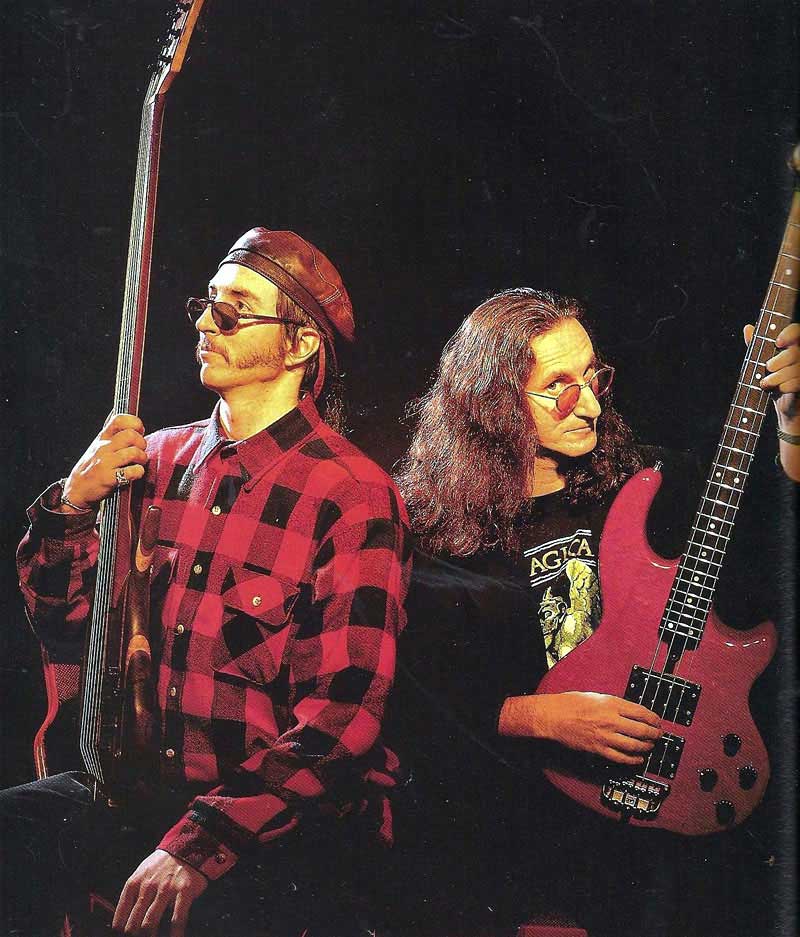
GW: On the surface, Rush and Primus are pretty dissimilar bands. How did the idea of playing these dates together develop?
LEE: It came to me in a dream.
CLAYPOOL: A nightmare!
LEE: I was being chased down a hall by this cheese monster with sideburns... No, basically we were given an option of a few opening bands, one of which was Primus. We listened to the tapes and liked the music.
CLAYPOOL: It's good to know that. 'Cause every time I'm interviewed, I'm asked how we hooked up with Rush. I've just been saying, "I don't know."
LEE: Really, that's how it was. The eccentricities of what you guys do appealed to us.
CLAYPOOL: It's funny. Some people say they don't see any similarity between our two bands. But others say, "Rush and Primus? Makes perfect sense."
LEE: I get the same kind of split reaction.
GW: Rush and Primus are bands where the bass player plays a very central role.
LEE: Yeah. In Les's band it has kind of a dominant role. [laughter] More so than in our band. In Rush, I think we trade off more. Everybody takes the spotlight from time to time, except in certain sections when everybody's going full tilt.
GW: Did you develop your respective bass styles out of a need to fill up space in a trio?
LEE: I think it was the drugs...
CLAYPOOL: I've always liked three-piece bands. A huge part of the reason for that is because I was the biggest Rush fan. My whole high school career was just Rush - I had Rush T-shirts, I went to every show, had every record, I read what little press came out on them. [laughter] So I've always liked trios, and I've always been a pretty aggressive player. I've been in bigger bands, but I tend to write chordy stuff for the bass that fills up a lot of space. I'd step on a lot of toes if Primus was a bigger band.
LEE: I think that when Rush started, the lack of a rhythm guitar definitely put pressure on me to fill in. My goal was to come up with a sound that was broader than just a thumping low end. All the bass players I liked when I was younger had aggressive, obnoxious sounds. Bands with real bottomy, soft-sounding bass players always reminded me of lounge acts. I was into people like Jack Bruce and John Entwistle, both of whom were basically in trios.
GW: Tonally, you two are somewhat similar in that you both use a healthy amount of treble for definition.
LEE: I think Les has got quite a different sound than me. It's like a fat guitar.
CLAYPOOL: Yeah? Well I've been trying to get your Moving Pictures tone for years.
LEE: I can sell you that bass. I've got it at home.
CLAYPOOL: [Pointing to Lee] I mean, him and Chris Squire - that was the tone!
LEE: My sound has changed over the last few years. It's gone from being distorted and midrangey with some aggressive top-end to being a real split of smoother top-end and smoother bottom-end. But that can change at any time. I just get bored with one sound, so I pick up another bass.
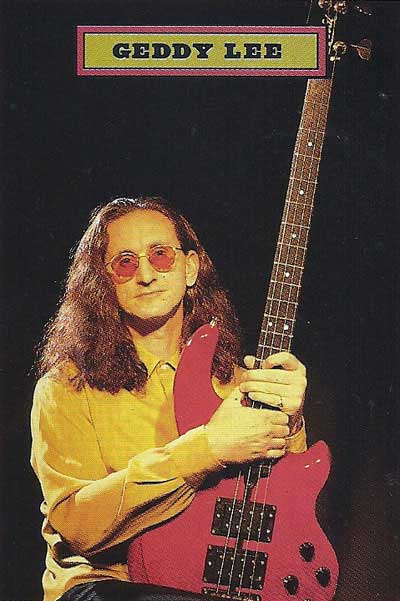
GW: It's been the Wal bass for you of late, right?
LEE: In the last few years, yeah. It has a great sound - and a very flexible one. It's an easy bass to work with in the studio. I can get a wide range of sounds from it. But I was admiring Les's basses today. They felt really good.
CLAYPOOL: I play Carl Thompson basses. I picked up a four-string years ago, because Stanley Clarke had one. I saw a used one in a shop and loved it.
LEE: What did you play before?
CLAYPOOL: I had just gotten an Ibanez Musician, but I got rid of it quickly and borrowed money to get the Carl Thompson. A few years later I saw one of his six-strings at a NAMM [National Association of Music Merchants] show. I had to have one. So I called Carl. He liked the fact that I knew all about him and his basses even though he'd never met me. He builds them in his apartment, on a custom basis. He's a funny, older guy. He told me, "I like you because you're weird - like me." When he made me the six-string, he said he was going to make the best bass he ever made in his life. That really killed me.
LEE: It's quite a piece of work.
GW: Both of you have made the "Best Bassist" category in Guitar World and Rolling Stone's reader's polls. Were either of you were aware of that?
LEE: I wasn't actually.
GW: Well both of you are in there.
CLAYPOOL: Hot diggity dog.
GW: Do such honors mean much?
CLAYPOOL: I think it's great.
LEE: Yeah, I think they do. When you do what you take pride in doing and get recognized for it, I think that has to have a positive impact on you. It's not like "Best Selling Record" or "Best Selling Whatever." 'Cause no matter what hat you wear in a band - whether you're the writer, producer or whatever - you ultimately go back to that instrument you first picked up. That's what you take the most pride in.
GW: Both of you are bass guitar role models.
LEE: How does it feel to be a role model, Les?
CLAYPOOL: Weird. I don't feel that way. There are some incredible bass players coming out of the woodwork - guys like Flea - who are really putting the bass at the forefront. When I first started playing, nobody wanted to play bass - everybody wanted to be Van Halen or Jimmy Page or whatever. But now a lot of kids want to play bass.
LEE: That's how I got my first gig as a bass player. I was playing guitar in a band, the bass player quit, and nobody wanted take his place. They voted that I should be the bass player, and I said, "I don't care. Two less strings - it'll be easier."
CLAYPOOL: I think it keeps the sperm count higher too. Those low frequencies.
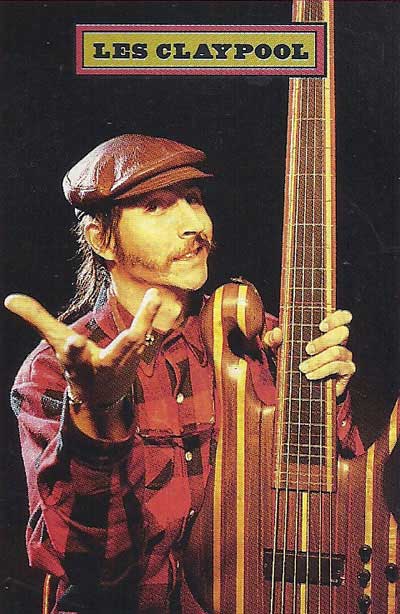
GW: Do you think that bass will ever join the guitar as a rock phallic symbol?
LEE: I don't know. What a question!
GW: Well, it's bigger, for one thing...
CLAYPOOL: That's true.
LEE: But bass players are always part of a rhythm section. That's how a lot of bass players and drummers develop good ears - they listen to each other. Often, guitar players don't listen to anybody - they just listen to themselves.
CLAYPOOL: But our guitar players aren't like that. Alex [Lifeson] is a team player - not a showoff.
LEE: Yeah, Alex keeps coming up with interesting chord variations. A lot of what he does is arpeggio-based. I don't think he gets a lot of credit for it, because it's such a subtle thing. But he takes up a lot of space and creates a lot of really interesting washes by coming up with these really bizzaro chord formations. He plays part of the chord aggressively and the other part very sensitively. That's a really unusual thing. Larry [La Londe, Primus' guitarist] has an interesting style in the same way. He creates really nice textures in a way that's not obvious.
GW: Is there a generation gap between the audiences for your two bands?
LEE: It's too early to tell.
CLAYPOOL: As to the audiences we're used to, I definitely see a difference. We just finished touring with Fishbone, and there were people flailing on top of each other - just this sea of writhing young kids.I was scared to do this tour because I spent so many years as a part of the Rush audience, and I have a lot of respect for Rush fans. It always seemed like the Rush fan was someone who analyzed things a little more, musically. There's always a lot of musicians in the audience, so I was worried about the odd tomato coming up and hitting me in the head.
LEE: With us, though, if the opening act is a band that can play, the audience eventually gets into it. I think that's one reason why you guys are doing well: they can hear what you're about.
GW: Primus is not an overtly melodic band. Does that freak them out?
CLAYPOOL: [with mock surprise] You mean my sweet vocal sound is out of tune?
LEE: You're talking about vocal melodies. But there are many melodies deep within the miasma of their arrangements.
CLAYPOOL: Miasma! I like that word.
GW: What was the most embarrassing copy band either of you were ever a part of?
LEE: I was never in a copy band - I've been in this band since I was in diapers. The closest we came to being a copy band was when we had to compromise and play a few songs by other people when we were doing bars, way back when. We tried to pick the most obscure songs by people that everyone liked. We'd pick some really strange David Bowie song - and completely screw up the arrangement. Just so we could put on our resume - "We play songs by David Bowie, etc., etc." It was always important for us to play our own songs, as terrible as they were in the beginning. We figured the only way we'd get better was to keep writing.
CLAYPOOL: I was in a great cover band for a while - an old r&b band. I was a young, 19-year-old guy, playing with guys in their late 20's and 30's. We played Wilson Pickett, James Brown - but there were a couple of songs we did that were a bit embarrassing. Our horn player always wanted to do these John Cougar covers. So we did things like "Hurts So Good." Larry was a little kid then, and he always reminds me of this. He lived in these apartment buildings across from a biker bar we played at - it was that type of band. And Larry, to this day, will still say, "I used to sit out on the back porch with my friends and listen to you guys, and we'd think what fags you were. John Cougar?"
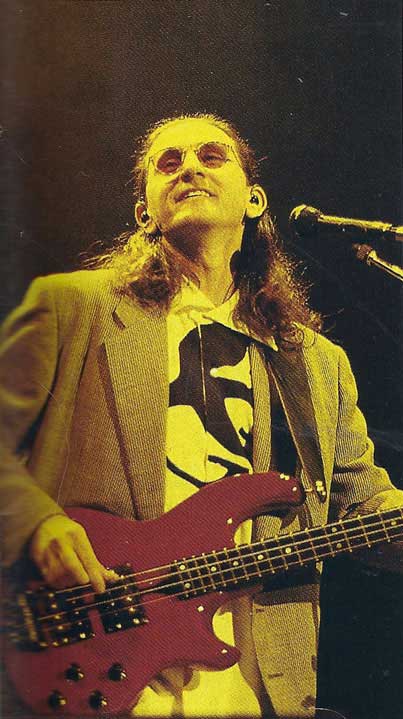
GW: What's with the Led Zeppelin riffs you worked into your show this evening, Les?
CLAYPOOL: Well, I just got this electric upright in a pawn shop, and there's not a whole lot I know how to play on it. But I can kind of bastardize "Kashmir."
GW: You also whipped out "Smoke On The Water."
CLAYPOOL: That was the very first song I learned to play - but I learned it in the wrong key.
GW: Everyone really seemed to enjoy the Zeppelin riffs this evening.
CLAYPOOL:You can't go wrong when you throw in a little Led Zeppelin. Every now and then I throw in the opening riff to "Cygnus X-1." [To Lee] I don't know if you heard it.
LEE: Is that what you call a satire?
GW: What was the first song you learned to play, Geddy?
LEE: I learned "For Your Love" by the Yardbirds on acoustic guitar. Classic. And the opening part of that Roy Orbison song. [Sings the riff to "Oh, Pretty Woman."] If you could figure that out, you were cool. I can't remember the first song I learned on bass, although I do remember that there was this old Rolling Stones song - I think it was called "2120 South Michigan Ave."
GW: On 12x5, yeah.
LEE: If you were a bass player way back then and could play that song, you were all right. It was one of those watersheds.
CLAYPOOL: I think the watershed for me, and it took me a long time to get it down, was the main line from "Roundabout."
GW: Geddy, under what conditions did you make was your first recording?
LEE: Like most first albums, it wasn't recorded under very advantageous conditions. We were playing bars, and we'd go in after a gig and record all night. It's a horrible way to make a record. But it was the only way we could afford to get studio time.
CLAYPOOL: How did the first record do? Did it bust open doors for you?
LEE: It was a real slow build. We were one of those bands that was rejected by everyone. They kept talking to us about doing singles deals; we wanted to make an album. So the record came out in Canada on our own label. We had a local following in Toronto, and all our fans bought it. They'd also call the radio station and request it incessantly. But no, it didn't go screaming anywhere, until a copy made its way to a radio station in Cleveland. The program director loved it and started playing it on the air. And as soon as they played it, they got all these phone-ins - and it all started from there.
CLAYPOOL: So was "Working Man" the big single?
LEE: Yeah. It got us a gig in Cleveland. This was when we still had John Rutsey on drums - it was the only American gig he ever did with us. [sic - Rush played in a festival in North Lansing Michigan one month before the Cleveland gig.] We opened up for ZZ Top purely on the strength of our import being played on that radio station. There was no American release at that point. We were completely freaked about doing the show. The crowd recognized the songs - we couldn't believe it! Even though Cleveland's not very far from Toronto, it might as well have been 2,000 miles away for what it represented to us: a gig in the States.
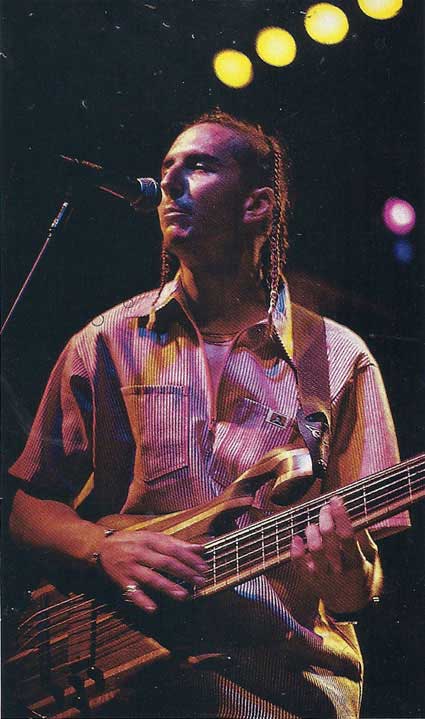
GW: How did you guys get your deal, Les?
CLAYPOOL: Basically, it took a lot of blow jobs on our part. Actually what we did was very similar to what Geddy described. We talked to labels, but they all wanted to "develop" us. We had kind of a cult following. But the band's whole lineup changed, and I was the only guy left from the original group.
LEE: Had you made a record at that point?
CLAYPOOL: No, but we had a demo called "Sausage" that was doing really well. Basically, Larry and "Herb" [a.k.a. Tim Alexander, Primus' drummer] had just joined the band, and I decided we needed to put out some vinyl. So we recorded a live album [Suck On This] at the Berkeley Square. I think it's our best-sounding record. We made it just for the fans. My Dad loaned us $3,000 to do it. He owns a transmission shop, and that was a lot of money for him. Larry and I would drive around in my Karman Ghia, delivering them to record stores.
LEE: That's interesting. Not dissimilar to how we started, really. You gotta do it yourself if you don't want to do what everybody else is doing. Because record companies usually sign...
CLAYPOOL: The least common denominator.
LEE: Well, aside from that, they'll sign anything that's popular at the moment. Even if it's the most complex music, they'll say, [assumes record company executive weasel-voice] "Complex music is in, let's go find some!"
GW: Now that you guys are on the road together, have you had much opportunity to jam?
LEE: Not yet. There was this one interesting jam that Alex sat in on with these guys. It was an avant garde - kind of a Fifties beatnik jam.
CLAYPOOL: I played drums.
LEE: But I hope we get an opportunity to do some of that stuff; I'm sure we will. There's quite a few dates left on the tour. It's funny, but jams like that rarely happen these days.
CLAYPOOL: But I want to play drums!
GW: Speaking of instruments, what do you guys like in bass amps?
LEE: I've been using the same stuff for years: BGW power amps, a Furman preamp and API studio equalizers, which are great. You can add tons of eq without noise. I've used that setup for years, but my bass technician finally told me that I have to come up with some bucks and buy a new amp. I'll let you know what my findings are. Les, I've noticed you use SWR amps.
CLAYPOOL: Yeah, and I have an ADA guitar preamp, just so I can make weird noises.
LEE: Is that what you use to get that heavy distortion sound?
CLAYPOOL: Yeah, but there are problems with it. There's a noise when you switch from the clean tube to the distorted tube.
LEE: Have you thought of getting a separate little equalizer for when you do those distorted sections?
CLAYPOOL: No.
LEE: Because sometimes, if the sound you're using gets weird through a particular distortion, you can put it through a separate equalizer and have both things come on at the same time. If you change the shape of the signal you send into the distortion unit, it sometimes solves all your problems.
The only pedal effect I use now is a little BOSS eq. And when I want the bass to poke out a little more, for a fill or something, I kick in the eq, and suddenly I have a little extra presence.
GW: Given all the work you do with synths, Geddy, have you ever messed around with MIDI bass?
LEE: No. I'm not interested; my bass is the last bastion of freedom for me. I've got so much MIDI stuff around me that I sometimes have nightmares. I look at my bass and say, "Baby, don't worry; that stuff ain't gonna touch you."
CLAYPOOL: I just picked up a clavinet at a pawn shop an old Hohner D-6.
LEE: The clavinet has a great sound. Never mind the top end of it; just the bass part. When I use synth bass in the studio, I often use a clavinet sound. It's got a great, really tight bottom-end sound.
GW: Les, I get the impression that you spend a lot of time on the road looking for obscure gear.
CLAYPOOL: Well, Larry and I do. Hopefully we'll bum out on it pretty soon.
LEE: You find great stuff that way. Les, you say you like that Moving Pictures sound?
CLAYPOOL: That's my ultimate goal.
LEE: That's a Jazz bass I found at a pawn shop for $170 dollars. It was all wrecked up, with a blonde neck.
CLAYPOOL: Is it an old one? Sixties?
LEE: I don't know how old it is.
CLAYPOOL: Has it got dots or squares on the fretboard?
LEE: Squares.
CLAYPOOL: That's Seventies.
LEE: It sounds great. I didn't screw it up, as I did with another old P-Bass I once had.
CLAYPOOL: Did you cut it into the shape of a star or something?
LEE: I cut it into the shape of a tear drop. [laughs] How did you know? I don't know what possessed me. It looks like an old '57 Chevy now. It has a really hideous, dogawful paint job dark blue that goes into baby blue that goes into white. I had an extra Jazz pickup added to it that never really worked.
CLAYPOOL: I bet your modifications totally changed the tone.
LEE: They changed it a lot; in some ways for the better. It's kind of wild - real aggressive. A beast. I used it for the encores on the first few tours we did as headliners.
GW: Whatever happened to your big, old double-necks?
LEE: I still have one at home. And I sold another to Andrew [MacNaughtan, Rush's resident photographer].
GW: So many bands have come and gone in your time, Geddy. How do you explain Rush's longevity?
LEE: Well, there's an element in our music that keeps us from being a "mainstream" band. Yet there are other elements that appeal to a lot of people. We're like the biggest cult band in the world. And we seem to make new fans every time around. It's a strange combination, and a fortunate one, because we've been able to continue to grow and experiment. Maybe the fact that we never became mainstream is our blessing. Maybe that would have led to obsolescence.
GW: We might conclude by asking Les whether the chicks are better on the alternative rock scene or here on the road with Rush.
CLAYPOOL: I've got a girlfriend. I don't even dabble in that. But don't say that in the article, 'cause then I won't be a sex symbol no more.